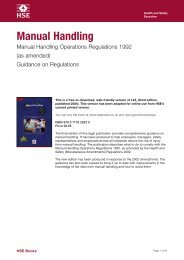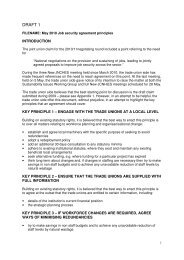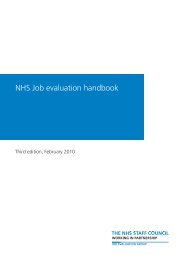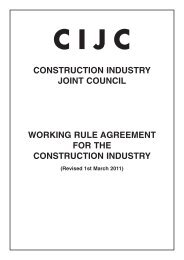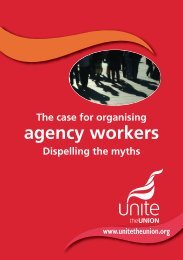Making Companies Safe - what works? (CCA ... - Unite the Union
Making Companies Safe - what works? (CCA ... - Unite the Union
Making Companies Safe - what works? (CCA ... - Unite the Union
You also want an ePaper? Increase the reach of your titles
YUMPU automatically turns print PDFs into web optimized ePapers that Google loves.
Gap in <strong>the</strong> law<br />
Yet despite <strong>the</strong> importance of Board level commitment and action to secure safe and healthy<br />
systems of work, <strong>the</strong>re is currently a gap in <strong>the</strong> regulatory framework in that company<br />
directors have no positive legal obligations to take measures to ensure that <strong>the</strong>ir companies<br />
are complying with <strong>the</strong> law. The only obligation <strong>the</strong>y have in law – and even this is not an<br />
explicit duty - is to take steps to rectify a situation if <strong>the</strong>y are aware that <strong>the</strong>ir company is not<br />
in legal compliance. 7 It has been argued that this lack of legal duties has a two-fold<br />
effect. First:<br />
“[First] it creates a situation where directors are left in effect to <strong>the</strong>ir own devices<br />
about how <strong>the</strong>y should conduct <strong>the</strong>mselves. While some may interest <strong>the</strong>mselves<br />
in <strong>the</strong> safety of <strong>the</strong> company, o<strong>the</strong>rs will not. [And secondly] it makes it difficult,<br />
and indeed sometimes impossible, to prosecute directors for ei<strong>the</strong>r manslaughter<br />
or for health and safety offences.” 8<br />
Since <strong>the</strong> lack of legal duties makes it easier for directors to escape prosecution for ei<strong>the</strong>r<br />
health and safety offences or for manslaughter, 9 <strong>the</strong>re may actually be an incentive on<br />
directors to ‘manage’ <strong>the</strong> risk of prosecution by delegating safety responsibilities down <strong>the</strong><br />
management chain, <strong>the</strong>reby ‘insulating’ <strong>the</strong>mselves from knowledge of safety problems in<br />
<strong>the</strong>ir companies.<br />
In <strong>the</strong> absence of clear legal obligations <strong>the</strong>re are often no o<strong>the</strong>r incentives on company<br />
directors to proactively manage health and safety. A number of studies, which will be<br />
discussed in greater detail in chapter 9, show that even in <strong>the</strong> context of major disasters<br />
where companies are prosecuted for breaches of <strong>the</strong> law, senior managers are often<br />
shielded from any adverse financial consequences or reputational damage. 10 In fact, one<br />
study has shown that <strong>the</strong> reputations of senior managers may actually be enhanced in <strong>the</strong><br />
eyes of shareholders following major disasters, since <strong>the</strong>y are judged – not for <strong>the</strong><br />
environmental or safety failures of <strong>the</strong>ir companies – but for <strong>the</strong>ir ability to ‘manage a crisis’. 11<br />
In light of <strong>the</strong>se findings and <strong>the</strong> lack of any positive legal obligations on company directors,<br />
it is reasonable to suppose that, in general, UK directors will not be highly motivated in<br />
relation to OHS issues. Anecdotal evidence and some recent survey data from <strong>the</strong> UK provide<br />
some support for this assumption. For instance, a recent study of <strong>the</strong> UK construction<br />
industry found reports that:<br />
“Most interviewees consider that workers adapt <strong>the</strong>ir attitude to health and<br />
safety on a project according to <strong>the</strong> overall attitude of site managers, and this in<br />
turn is dependent on <strong>the</strong> attitude of senior management. In general, senior<br />
management are poor at demonstrating <strong>the</strong>ir commitment to health and safety<br />
and rarely visit <strong>the</strong> construction site… Low levels of management commitment<br />
probably reflect <strong>the</strong> level of importance which some clients place on health and<br />
safety. The majority of interviewees feel that <strong>the</strong>re has been no change in <strong>the</strong><br />
acceptance of responsibility for health and safety by management.” 12<br />
And anecdotal evidence arising out of <strong>the</strong> DETR and HSC’s consultation in 1999 on a new<br />
health and safety strategy also suggests that <strong>the</strong> majority of directors and senior managers<br />
fail to prioritise health and safety:<br />
“Responses from health and safety practitioners pointed unanimously to <strong>the</strong><br />
perception of a low profile for <strong>the</strong>ir profession with little support from senior<br />
management.” 13<br />
Finally, Osborne and Zairi, in a comprehensive study of companies known to be advanced in<br />
<strong>the</strong>ir use of Total Quality Management (TQM), identified “a leadership vacuum at executive<br />
level in respect of health and safety”, and could discover:<br />
“no evidence of real enthusiasm for H & S management coming from and through<br />
executive and senior management.” 14<br />
24










